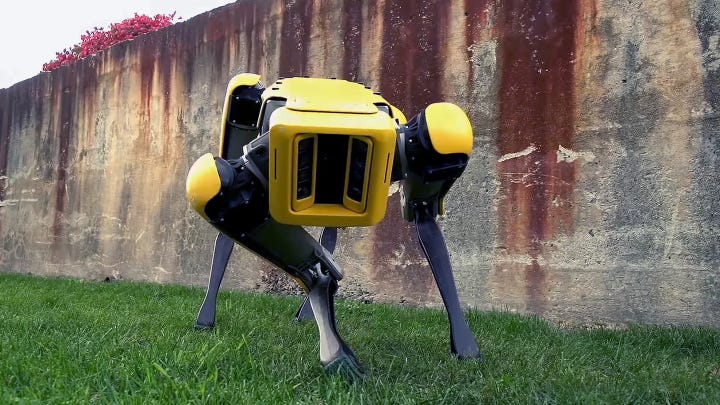Issue #234 - the Olympic games for cyborgs; Boston Dynamics' Spot joins the police; the next software revolution is bio; and more!
View this email in your browser
This week - the Olympic games for cyborgs; Boston Dynamics' Spot joins the police; the next software revolution is bio; and more!
H+ Weekly Special - The Timeline of the Future
This idea was in my head for a while now. Since this year we reached the Blade Runner's and Akira's future, I was wondering which sci-fi futures are we going to reach in the next years. So I combined many future sci-fi events with real-life predictions and planned events, and created The Timeline of The Future. It was interesting for me to see how future events intertwined with fiction (like Heathrow's expansion should happen at the same time as the First Hundred landed on Mars in Red Mars). Check it out and let me know what do you think about it!
MORE THAN A HUMAN
► The Cybathlon pushes the limits of bionic technology (5:43)

Cybatlhon is like Olympics but for bionic people. The competitions sound futuristic - prosthesis races, exoskeleton races, powered wheelchair races, brain-computer interface races. The tasks in those competitions are quite mundane for a normal person, like change a bulb, but a challenging for people with prosthesis and for engineers who design them.
Cyborg warriors could be here by 2050, DoD study group says
Ear, eye, brain and muscular enhancement is “technically feasible by 2050 or earlier,” according to a study released by the U.S. Army’s Combat Capabilities Development Command. “This technology is predicted to facilitate read/write capability between humans and machines and between humans through brain-to-brain interactions,” an executive summary reads. “These interactions would allow warfighters direct communication with unmanned and autonomous systems, as well as with other humans, to optimize command and control systems and operations.”
Our Cyborg Future - Ghislaine Boddington & Moon Ribas w/ Luke Robert Mason @ Pioneers 2019
Here is a conversation with two real-life cyborgs and cyborg pioneers - Moon Ribas and Ghislane Boddington - about the future of cyborgs and body augmentations.
ARTIFICIAL INTELLIGENCE
Computers Evolve a New Path Toward Human Intelligence

Neuroevolution is the latest trend in AI research. It promises more creative AIs that are not afraid to explore the world instead of fixating on a solution. The technique is being used by DeepMind in their StarCraft II agent AlphaStar and is researched by top tech companies and universities. This article gently explains how neuroevolution works and how it came to be.
World champion Go player retires: AI ‘cannot be defeated’
Lee Se-dol, the world champion in Go who faced DeepMind's AlphaGo in 2016, announced retirement from professional sport, saying: "With the debut of AI in Go games, I’ve realized that I’m not at the top even if I become the number one through frantic efforts. Even if I become the number one, there is an entity that cannot be defeated."
Here’s why AI deserves the same rights as animals
Here is an interesting concept - AI should have the same rights as animals. We are nowhere close to human-level AI but we are getting closer to animal-level AIs and depending on your definition of consciousness, they could be conscious. Biomedical research already grants some rights to animals so maybe AI should too, argues the article.
ROBOTICS
Police Tested Out Boston Dynamics’ Spot The Robot Dog. Civil Liberties Advocates Want To Know More

Massachusetts State Police is the first law enforcement agency in the country to use Boston Dynamics' dog-like robot Spot, causing some ethicists and civil rights advocates about how much oversight there should be over police robotics programs.
Don’t Let Robots Pull the Trigger
Here's another voice against weaponising robots and AI. It points out that cheap robotic weapons like drones should be classified as a weapon of mass destruction and regulated like biological or chemical weapons and be banned.
BIOTECHNOLOGY
► The next software revolution: programming biological cells (14:47)

The cells in your body are like computer software: they're "programmed" to carry out specific functions at specific times. If we can better understand this process, we could unlock the ability to reprogram cells ourselves, says computational biologist Sara-Jane Dunn. In a talk from the cutting-edge of science, she explains how her team is studying embryonic stem cells to gain a new understanding of the biological programs that power life - and develop "living software" that could transform medicine, agriculture and energy.
Cellular Computers Get a Boost With CRISPR
Researchers at MIT made a bacteria that reads and writes life events into single letters in its DNA. Unlike previous generations of cellular recorders that disrupt large chunks of genomic information, their method alters data at the “bit” level. This keeps the cell functional, while massively increasing accuracy and storage capacity. What’s more, scientists can layer the operations using logic gates, essentially turning cells into a computational powerhouse.
Thank you for subscribing,
Conrad Gray (@conradthegray)
If you have any questions or suggestions, just reply to this email or tweet at @hplusweekly. I'd like to hear what do you think about H+ Weekly.
Follow H+ Weekly!


